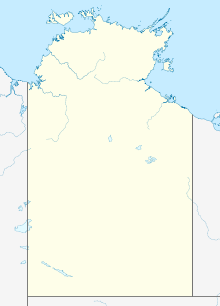Jabiluka uranium mine

Jabiluka development site.
|
|
| Location | |
|---|---|
| Location | Kakadu National Park |
| Territory | Northern Territory |
| Country | Australia |
| Coordinates | 12°29′55.18″S 132°54′49.72″E / 12.4986611°S 132.9138111°ECoordinates: 12°29′55.18″S 132°54′49.72″E / 12.4986611°S 132.9138111°E |
| Production | |
| Products | Uranium |
| History | |
| Opened | never mined |
| Owner | |
| Company | Energy Resources of Australia Limited |
| Website | http://www.energyres.com.au/ |
Jabiluka is a pair of uranium deposits and mine development in the Northern Territory of Australia that was to have been built on land belonging to the Mirarr Aboriginal people. The mine site is surrounded by, but not part of, the World Heritage–listed Kakadu National Park.
Exploration on the site began in the late 1960s with Jabiluka 1 being discovered in 1971 and the much larger Jabiluka 2 discovered in 1973. The Jabiluka deposits were included in the group of Uranium deposits that were the subject of the Fox Enquiry. As a result of this enquiry, the Jabiluka mining lease and two others were created along with Kakadu National Park. Feasibility works into the development of the mine were well progressed at the time of the Australian federal election, 1983, which saw the Australian Labor Party take government. Under this government, an export licence for the Uranium was unlikely to have been granted and the project development was stopped. Energy Resources of Australia Ltd bought the deposit from Pancontinental and proceeded without background work. Upon the election of the Howard Liberal Government in 1996, the project was once again placed into development.
In 1998 the issue came to a head when Jacqui Katona and Yvonne Margarula, of the Mirarr people, called on activists to come from around Australia and the world to blockade the construction of the mine by Energy Resources of Australia (ERA). Over 500 people were arrested in the course of the eight-month blockade.
ERA developed the surface infrastructure and the decline down to the ore-body to allow for further definition of the resource. Falling uranium prices prevented the project from proceeding. ERA's parent company, North Ltd, was bought by Rio Tinto Group, who announced that the mine will not go ahead – at least until their nearby Ranger uranium mine is mined out.
...
Wikipedia

